To improve your dog's sleep quality, start by creating a quiet, comfortable sleeping environment and a cozy bed that suits their needs. Establish a consistent sleep schedule, limiting naps during the day to guarantee they're weary at night. Regular exercise is key; aim for at least 30 minutes a day to burn off energy. Incorporate calming evening rituals, like gentle massages or soft music, to signal it's time to unwind. Finally, monitor their health with regular check-ups to address any potential issues. Stick around to discover more tips for creating the ideal sleep routine for your furry friend!
Ideal Sleeping Environment
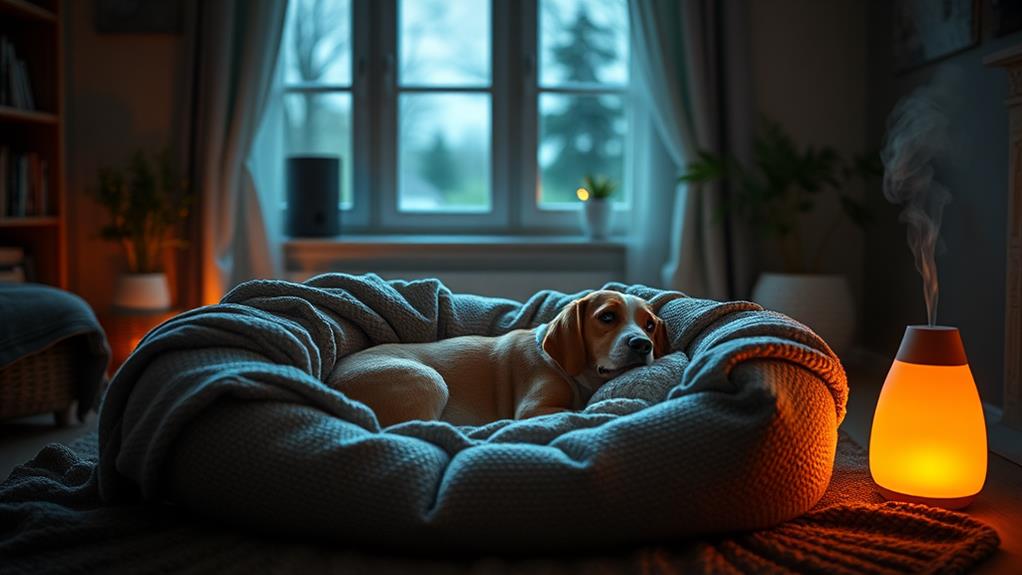
Creating an ideal sleeping environment for your dog can dramatically enhance their sleep quality. Start by choosing a quiet, comfortable space away from household noise and distractions. A cozy corner or a dedicated room can provide the peace your dog needs for restorative rest.
Next, pick the right bedding. A supportive dog bed with proper cushioning can alleviate joint strain, especially for older dogs. Look for materials that suit your dog's sleeping style, whether they like to curl up or stretch out.
Temperature is also indispensable; dogs often prefer a cool, well-ventilated area. Ensure your dog's sleeping spot isn't too hot or drafty, and consider using blankets for warmth during colder months.
Adding familiar scents can further enhance comfort. Placing a piece of your clothing or their favorite blanket can create a sense of security.
Consistent Sleep Schedule
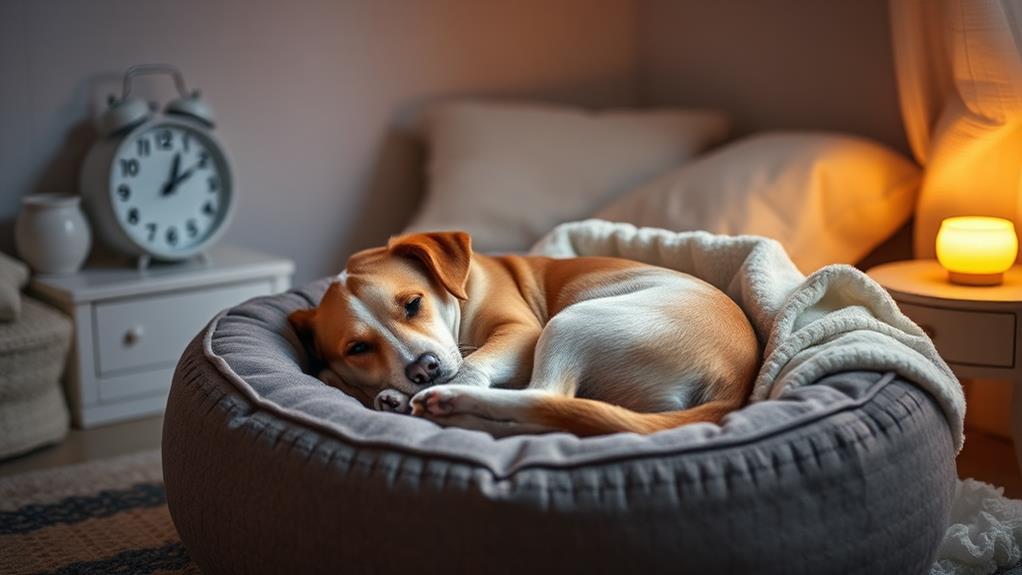
A consistent sleep schedule can substantially impact your dog's overall sleep quality. Just like humans, dogs thrive on routine. By setting regular times for sleeping and waking, you help regulate their internal clock, leading to better rest and improved mood.
| Tip | Explanation |
|---|---|
| Set a Regular Bedtime | Choose a specific time for your dog to go to bed each night, helping them wind down. |
| Wake Up at the Same Time | Get your dog up at the same time every morning to maintain a stable routine. |
| Limit Naps During Day | While naps are important, try to restrict daytime sleep to guarantee they're tired at night. |
Comfortable Bedding Options
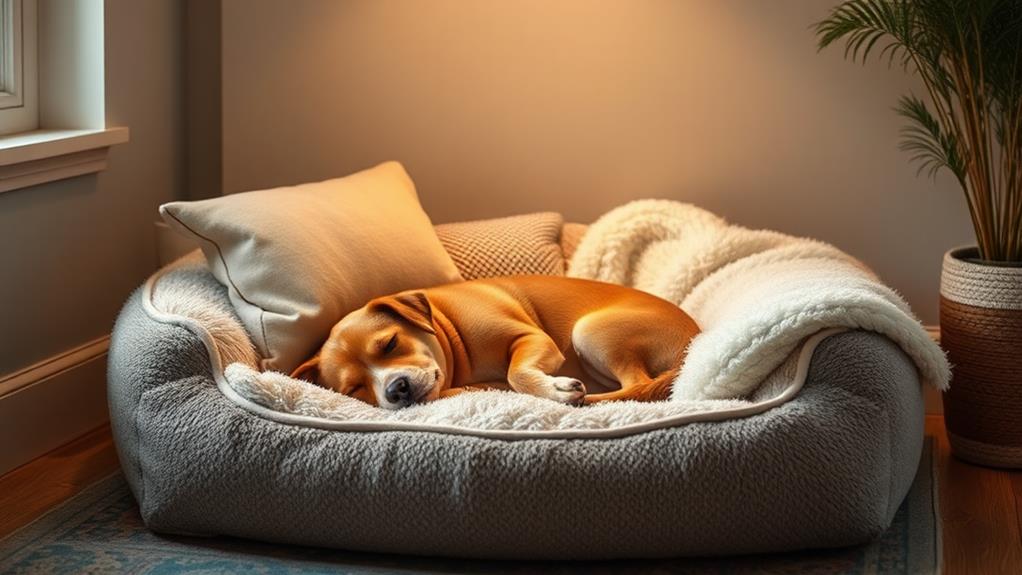
Choosing the right bedding can substantially enhance your dog's sleep quality. Start by considering your dog's size and sleeping style. Dogs that love to curl up might appreciate a cozy, round bed, while those who like to stretch out may prefer a rectangular or orthopedic option.
Material matters too. Look for beds made from high-quality, durable fabrics that provide comfort and warmth. Memory foam beds are excellent for older dogs, offering support for joints and reducing pressure points.
Don't forget about the fill. Options like polyester, cotton, or even natural materials like wool can influence comfort. Waterproof liners can also be a smart choice, protecting the bed from accidents and making cleaning easier.
If your dog tends to get hot or cold easily, consider temperature-regulating beds or those with removable covers that are machine washable.
Regular Exercise Routine
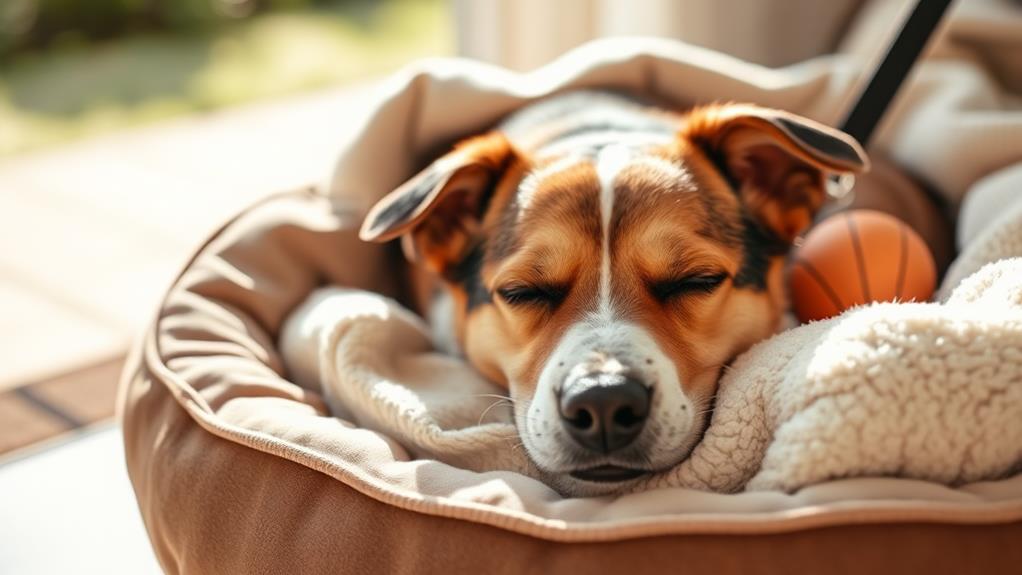
Alongside comfortable bedding, establishing a regular exercise routine plays a crucial role in improving your dog's sleep quality. Dogs, like humans, need physical activity to expend energy and maintain a healthy lifestyle. When you engage your dog in daily exercise, you help them burn off excess energy that might otherwise lead to restlessness at night.
Aim for at least 30 minutes of exercise each day, depending on your dog's age, breed, and energy level. Activities like brisk walks, fetch, or interactive play sessions can greatly enhance their physical well-being. As they tire out from these activities, you'll likely notice a marked improvement in their ability to relax and fall asleep.
Consistency is key, so try to stick to a schedule. Regular exercise not only promotes better sleep but also contributes to your dog's overall health, keeping their weight in check and reducing anxiety. Remember, a tired dog is a happy dog, and that happiness translates to better sleep for both you and your furry friend. Make exercise a priority, and watch as your dog's sleep quality improves tremendously!
Calming Evening Rituals
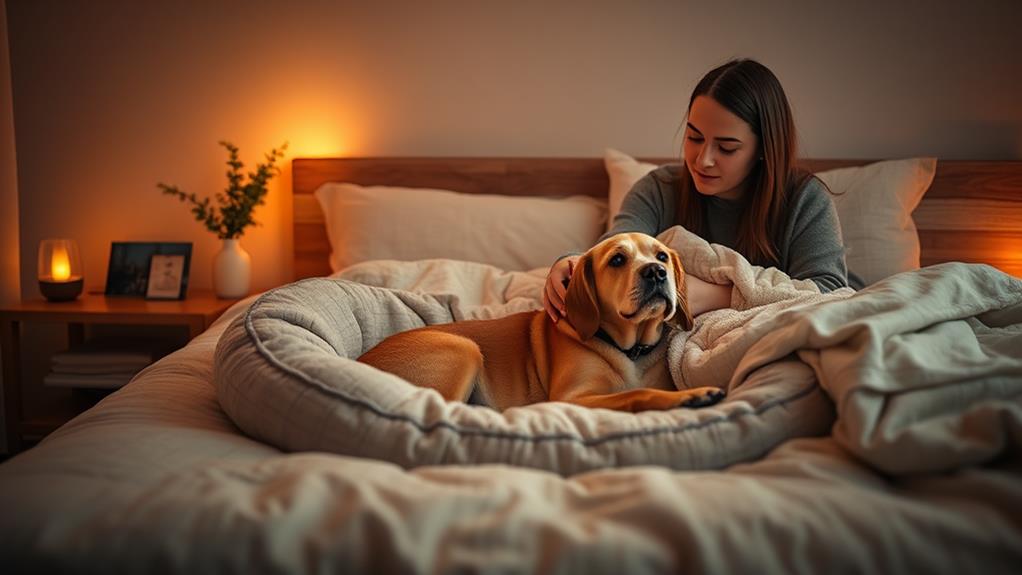
Establishing calming evening rituals can substantially enhance your dog's ability to unwind before bedtime. Creating a consistent routine helps signal to your pup that it's time to relax.
Start by dimming the lights and playing soft music to set a tranquil atmosphere.
Next, consider a gentle massage or brushing session. This not only relaxes your dog but also strengthens the bond between you two. Try to incorporate quiet activities, like cuddling on the couch or reading a book, which can help your dog feel secure and calm.
Introduce a specific bedtime cue, such as a soft command or a special phrase. Consistently using this cue will help your dog associate it with sleep. You might also want to establish a designated sleeping area, filled with familiar blankets or toys, to create a cozy den-like environment.
Nutrition and Sleep Connection

A dog's nutrition plays a significant role in their overall sleep quality. The food you provide impacts not just their energy levels but also how well they rest at night. A balanced diet rich in essential nutrients can promote better sleep by supporting overall health.
Make sure your dog's meals include high-quality proteins, healthy fats, and complex carbohydrates. Proteins help build and repair tissues, while healthy fats provide energy and support brain health. Complex carbohydrates can help regulate blood sugar levels, which is vital for stable energy throughout the day.
Keep an eye on the timing of your dog's meals. Feeding them too close to bedtime can lead to discomfort, making it harder for them to settle down. Instead, aim for a feeding schedule that allows for proper digestion before they sleep.
Also, consider incorporating specific nutrients known to promote relaxation, such as omega-3 fatty acids or tryptophan. These can help calm your dog's mind and prepare them for a restful night. By focusing on their nutrition, you can create a solid foundation for improved sleep quality and, ultimately, a happier, healthier dog.
Stress Reduction Techniques
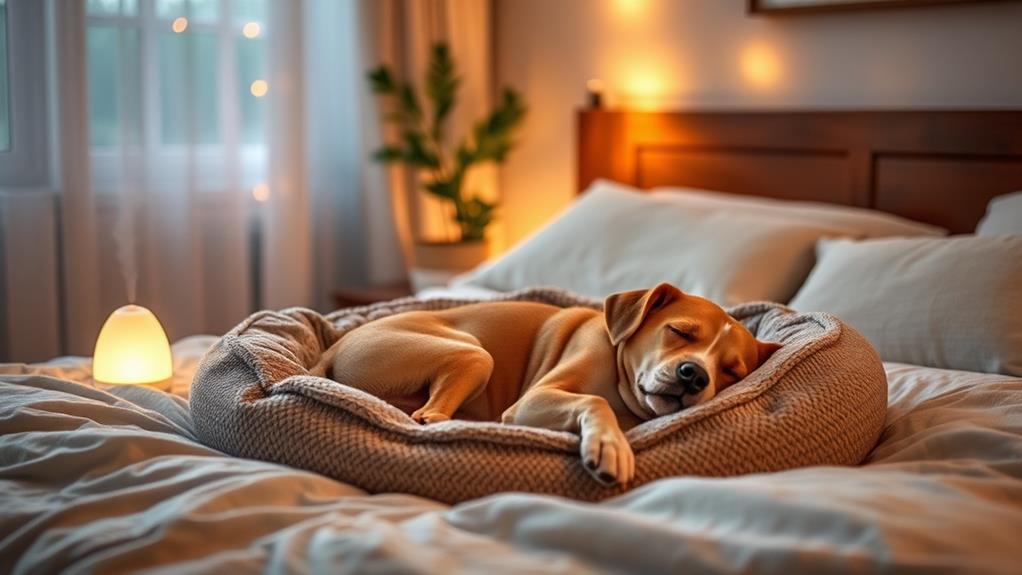
Many dog owners underestimate the impact of stress on their pets' sleep quality. Just like humans, dogs can experience stress, which often leads to restless nights.
To help your furry friend relax, start by creating a calming environment. Make sure their sleeping area is quiet, comfortable, and free from distractions. Consider using a cozy bed with familiar blankets.
Routine is essential for reducing anxiety. Establish a consistent daily schedule for feeding, walks, and playtime. This predictability can help your dog feel more secure and relaxed. Additionally, engage in regular exercise; a good walk or play session can help release pent-up energy, making it easier for your pup to settle down at night.
You might also want to explore stress-reduction techniques like gentle massage or using calming music designed for dogs. These practices can substantially lower anxiety levels and promote better sleep. If your dog shows signs of stress, such as whining or pacing, be patient and provide reassurance. With time and the right strategies, you can create a peaceful atmosphere that allows your beloved pet to enjoy restful, restorative sleep.
Health Check-Ups

Regular health check-ups are essential for ensuring your dog sleeps soundly at night. These appointments help catch any potential health issues early, allowing for timely treatment.
If your dog is experiencing discomfort or pain, it can greatly affect their quality of sleep. During check-ups, your vet will assess your dog's weight, dental health, and overall physical condition, which are paramount for their well-being.
Weight Assessment: Prevents obesity-related issues
Dental Examination: Supports oral health and comfort
Vaccinations: Protects against diseases that can cause discomfort
Parasite Control: Prevents infestations that can disrupt sleep
Blood Tests: Detects underlying health problems early
Temperature Control Tips
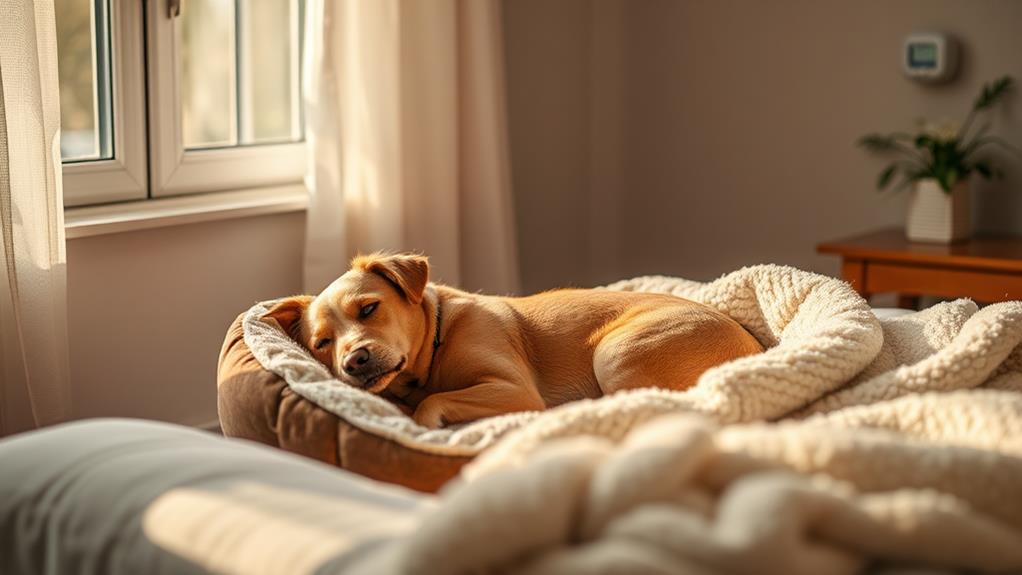
Creating a comfortable sleeping environment for your dog hinges on effective temperature control. Start by monitoring the ambient temperature in your home, especially in the area where your dog sleeps. Ideally, keep it between 68°F and 72°F, as this range is generally comfortable for most dogs.
If it's too hot, consider using fans or air conditioning to cool the space down. You can also provide a cooling mat or damp towel for your dog to lie on. Conversely, if it's chilly, make certain your pup has a warm bed or blanket. Heated dog beds can be a great option during colder months.
Pay attention to your dog's preferences. Some dogs enjoy snuggling up in blankets, while others prefer being more exposed. You might also want to adjust their sleeping area based on the season. In summer, a well-ventilated spot is vital, while in winter, a cozy nook away from drafts works best.
Lastly, be mindful of how your dog reacts to temperature changes. If they seem restless or excessively panting, it may be time to adjust their surroundings for a better night's sleep.
Safe Sleeping Spaces
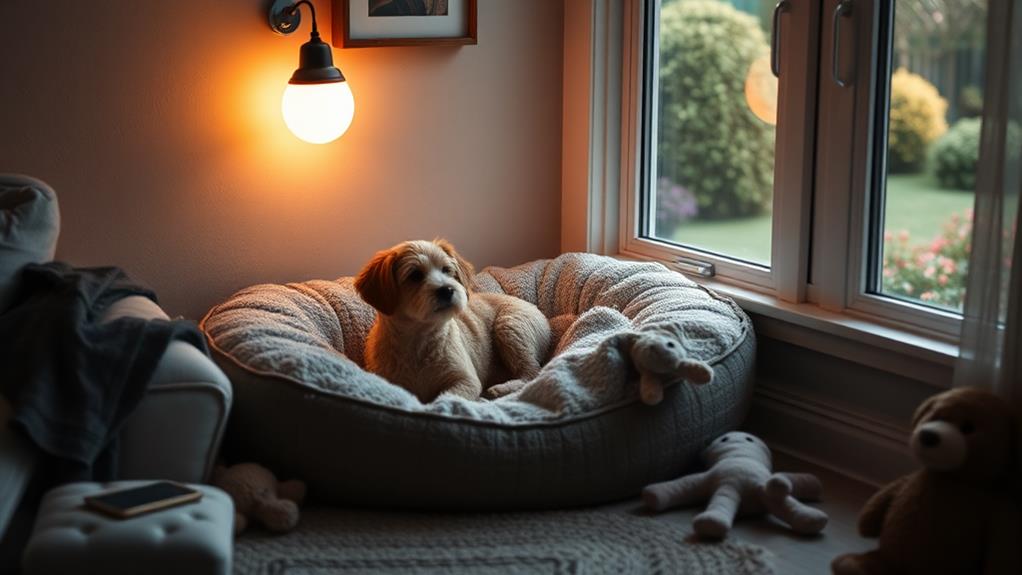
A comfortable temperature is just one aspect of guaranteeing your dog gets a good night's sleep; the safety of their sleeping space matters too. You want to create an environment where your furry friend feels secure and relaxed.
Start by choosing a designated sleeping area that's free from hazards. Avoid placing their bed near stairs, sharp objects, or anything that could fall and injure them.
Consider using a dog bed with sturdy, non-slip materials to prevent any accidents. If your dog is still a puppy or an older dog, they might be unsteady on their feet, so a stable surface is essential. Also, keep their sleeping area clear of clutter, as this can reduce anxiety and create a more inviting space.
If your dog tends to wander or explore at night, a crate can provide a safe retreat. Make sure it's the right size—big enough for them to stand, turn around, and lie down comfortably. Ultimately, check the surroundings for any potential dangers, like cords or toxic plants, to guarantee your dog's sleeping space is truly safe. With these precautions, you'll help your canine companion sleep soundly and peacefully.
Frequently Asked Questions
Can My Dog's Breed Affect Their Sleep Quality?
Yes, your dog's breed can affect their sleep quality. Certain breeds have different energy levels, sleeping patterns, and needs. Understanding your pup's specific traits helps you create a restful environment for better sleep.
How Much Sleep Do Dogs Need on Average?
Dogs generally need 12 to 14 hours of sleep daily, depending on their age, breed, and activity level. You'll notice younger dogs tend to sleep more, while older dogs may require additional rest for recovery.
Should I Wake My Dog if They Snore?
Did you know that around 30% of dogs snore? If your dog's snoring doesn't disturb their sleep or breathing, it's best to let them rest. Waking them might cause stress or confusion.
Are There Signs My Dog Isn't Sleeping Well?
Yes, there are signs your dog's not sleeping well. You might notice restlessness, excessive barking, or changes in appetite. If your dog seems anxious or irritable, it's a good idea to consult your vet.
Can Anxiety Medication Improve My Dog's Sleep?
Imagine your dog's restless nights, like a child tossing and turning. Anxiety medication can help calm those racing thoughts, allowing your furry friend to sleep soundly. It can make a significant difference in their restfulness.
Conclusion
By nurturing your dog's sleep quality, you're crafting a sanctuary of rest—a cozy nest where dreams take flight. With a consistent routine and a serene environment, you're not just providing comfort; you're building a fortress against the chaos of the day. As you weave in exercise, calming rituals, and health check-ups, you transform their nights into peaceful retreats. Ultimately, your efforts create a symphony of tranquility, allowing your furry friend to flourish in both body and spirit.



